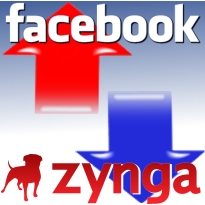 Troubled social games developer Zynga is laying off 5% of its full time workforce, closing its Boston office and killing off 13 game titles in an attempt to right its sinking ship. The games on the chopping block weren’t identified, but Reuters obtained a copy of a memo Zynga CEO Mark Pincus issued to employees which stated that the company would be reducing its investment in The Ville – a game that only recently debuted – and the Austin, Texas studio in charge of its development. The layoffs – roughly 142 members out of Zynga’s total 2,846 staff – may yet extend to the closing of its Japanese and UK offices. In the memo, Pincus stated the moves were necessary to “streamline our operations, focus our resources on our most strategic opportunities, and invest in our future.”
Troubled social games developer Zynga is laying off 5% of its full time workforce, closing its Boston office and killing off 13 game titles in an attempt to right its sinking ship. The games on the chopping block weren’t identified, but Reuters obtained a copy of a memo Zynga CEO Mark Pincus issued to employees which stated that the company would be reducing its investment in The Ville – a game that only recently debuted – and the Austin, Texas studio in charge of its development. The layoffs – roughly 142 members out of Zynga’s total 2,846 staff – may yet extend to the closing of its Japanese and UK offices. In the memo, Pincus stated the moves were necessary to “streamline our operations, focus our resources on our most strategic opportunities, and invest in our future.”
Rumors of the cost-cutting measures had circulated on game and tech blogs on Tuesday before the company made the memo public. Cynics noted that Zynga timed the release of its statement to coincide with Apple’s iPad Mini unveiling, presumably in the vain hope that the markets wouldn’t notice. Fat chance. Zynga shares dipped as low as $2.16 on Tuesday before recovering slightly to close trading down 12 cents (5.17%) to $2.20. Zynga is scheduled to release its Q3 earnings report on Wednesday, and investors are bracing for impact. Preliminary results released earlier this month estimated revenues in the range of $300m-$305m and bookings of $250m-$255m, both figures representing mere shadows of earlier, rosier forecasts. When the final figures are released, Zynga is expected to report net losses of $90m-$105m for the quarter.
FACEBOOK FINDS MOBILE MOJO
While Pincus was breaking the news to employees, Facebook CEO Mark Zuckerberg was breaking Pincus’ balls on a conference call with analysts to discuss the social network’s own Q3 report card. Zuckerberg said gaming on Facebook “wasn’t doing as well as I’d like” and revealed that Zynga contributed 7% of Facebook’s Q3 revenues, down from 10% in Q2. Twisting the knife, Zuckerberg said user spending in Zynga games has fallen 20% while spending in non-Zynga games had risen 40%.
Despite Zynga’s dog having taken a dump on the carpet, Facebook turned in numbers that (just) beat analysts’ expectations. Facebook lost $59m in Q3, but excluding special items like stock compensation expenses, earnings came in at $311m or 12 cents per share; a penny more than analysts’ predictions. Revenue was up 32% to $1.26b. Ad revenue rose 36% to $1.09b – $152.6m (14%) of which came from those all important mobile ads – while payments and other fees brought in $176m.
The mobile figure is the first time Facebook has disclosed its mobile earning capacity, and Zuckerberg was keen to “dispel this myth that Facebook can’t make money on mobile.” However, the increase in mobile ad sales was tempered by a decline in desktop ad sales, suggesting a degree of cannibalization is occurring, and Facebook’s expenses – including those annoying stock compensation commitments – are rising twice as fast (64%) as its revenues. Another 234m shares are due to be released from lockup on Monday and a further 777m on Nov. 14.
Facebook’s monthly user base rose 26% over the previous year to 1.01b, of which mobile users represent 604m, a rise of 61%. Daily active users were 584m in September, up 28% over the previous year. As is its habit, Facebook declined to offer any guidance on its future performance. Facebook shares closed out the day up just under 1% to $19.50, but have risen over 10% in after-hours trading.